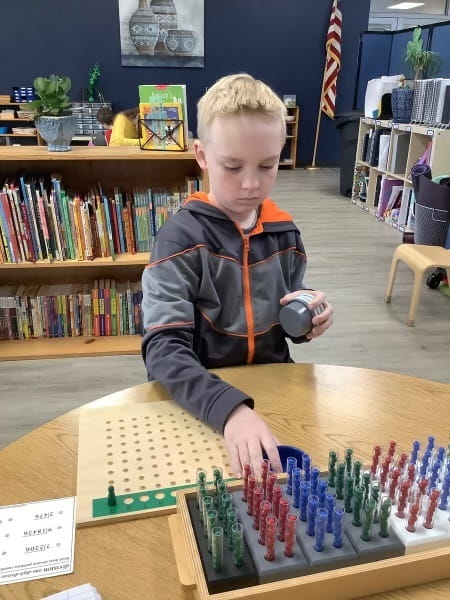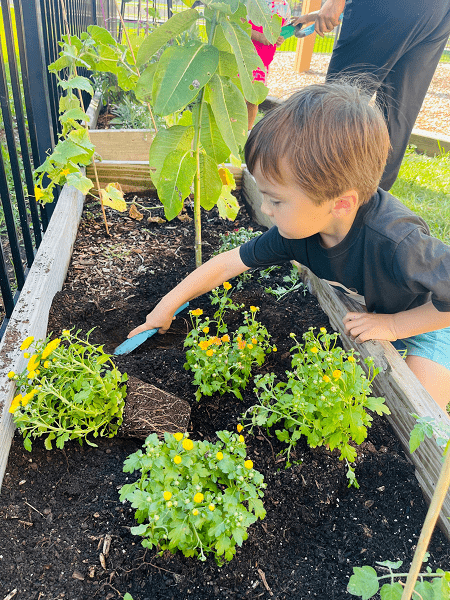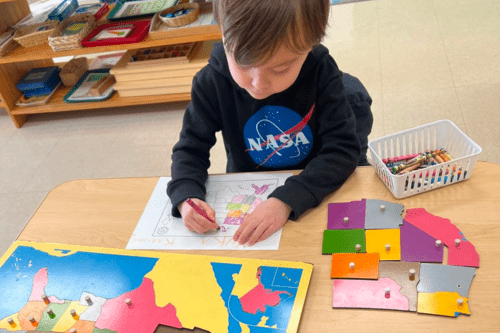Alexander Graham Bell was an advocate who held both positive and problematic views of the deaf community. He was a deaf educator and a strong advocate for finding ways to help the deaf succeed with language. He was also a great supporter of Montessori Education. In fact, he and his wife Mabel sponsored one of the first Montessori schools in the United States and hosted a large reception for Maria Montessori when she visited the United States in 1913.
Given Bell’s unique influence and involvement in the world of Montessori and in the deaf community, it seemed only fitting when Alexander Graham Bell Montessori School (AGBMS) (located in Wheeling, IL) was founded in 1986 by a group of five families with deaf children that celebrated his legacy by becoming his namesake.
The founding families originally established a not-for-profit organization known as Alternatives in Education for Deaf and Hard-of-Hearing Individuals (AEHI). AEHI advocated for the use of a special mode of communication for the deaf called Cued Speech, a system of hand cues which, when used in conjunction with the natural mouth movements of speech, provides deaf and hard-of-hearing (HoH) children with 100% clear visual access to the sounds of any spoken language. The families experienced much success using cued spoken English with their children at home and were eager for them to receive the same cueing at school as well. They recruited a teacher of the deaf who was trained in Cued Speech and a certified Montessori guide who was willing to learn to cue and together they founded AGBMS.
Furthering the Founding Mission of AGBMS
 According to Julissa Zenteno, AGBMS executive director, the “families and educators who founded the school were dedicated to building a school where deaf and hearing children could experience the very best Montessori education together using Cued Speech to make spoken language completely accessible to all.” This mission still rings true today as AGBMS remains dedicated to providing all of their students with excellent and authentic Montessori programming and in providing deaf children, via the use of Cued Speech, with 100% access to a Montessori Education.
According to Julissa Zenteno, AGBMS executive director, the “families and educators who founded the school were dedicated to building a school where deaf and hearing children could experience the very best Montessori education together using Cued Speech to make spoken language completely accessible to all.” This mission still rings true today as AGBMS remains dedicated to providing all of their students with excellent and authentic Montessori programming and in providing deaf children, via the use of Cued Speech, with 100% access to a Montessori Education.
At AGBMS, children who are deaf or HoH are mainstreamed with the general education population and are provided with full access to the general curriculum via the use of Cued Speech. They are the only Montessori school accredited by the American Montessori Society that offers this unique educational approach, combining the benefits of a challenging, mainstream Montessori curriculum, individualized and small-group instruction, unlimited opportunities for interaction with hearing peers, and an intense focus on oral communication skills. Zenteno exclaims that this method “provides all students with a unique opportunity to experience diversity and inclusion.”
Deaf and HoH students also receive additional pull-out and push in support from members of the Deaf Services Team (including a teacher of the deaf, speech and language pathologist, occupational therapist, physical therapist, and learning behavior specialist) which are defined in each child’s Individual Education Program (IEP).
According to Zentento, AGBMS is also special in that it is a 501(c)(3) not-for-profit corporation “with a recognized purpose of empowering deaf children and children with other communication challenges to achieve age-appropriate language and literacy levels and overall academic success.”
Strengthening Diversity, Equity, and Inclusion
 To strengthen diversity, equity, and inclusion, AGBMS is also working on developing a few other programs. A Korean Immersion program is expected to begin in January 2024 based upon a family proposal. AGBMS is central to a large Korean population and is located near the Korean Cultural Center of Chicago. The pilot program is being offered as a half-day full immersion experience for children ages three to six under the supervision of a Montessori intern teacher who speaks Korean. They have also applied to the IL Early Childhood Block Grant for Infants and Toddlers and Pre-K, proposing to serve low-income families and to provide high quality Montessori educational programs for children who are determined to be at risk of academic failure. If granted, these programs will begin in Fall 2024.
To strengthen diversity, equity, and inclusion, AGBMS is also working on developing a few other programs. A Korean Immersion program is expected to begin in January 2024 based upon a family proposal. AGBMS is central to a large Korean population and is located near the Korean Cultural Center of Chicago. The pilot program is being offered as a half-day full immersion experience for children ages three to six under the supervision of a Montessori intern teacher who speaks Korean. They have also applied to the IL Early Childhood Block Grant for Infants and Toddlers and Pre-K, proposing to serve low-income families and to provide high quality Montessori educational programs for children who are determined to be at risk of academic failure. If granted, these programs will begin in Fall 2024.
Outreach Efforts
In support of the research backing the value of Cued Speech in the home as well as in the school setting, AGBMS has also expanded their mission to provide outreach programming families and educational programs throughout the Midwest and beyond. This important second mission is carried out by the part of their organization still known as AEHI.
AEHI staff provide regular on-site and custom off-site Cued Speech workshops for families and professionals. They assist other educational institutions in implementing their own Cued Speech programs including, over the years, many Chicago area school districts as well as the Illinois School for the Deaf. AEHI also organizes and participates in professional conferences, conventions, and events all over the United States.
In 2015, AEHI developed and launched an online educational platform called Cue College in furtherance of its mission to make Cued Speech information, training, and resources fully accessible to families and professionals affordably and on a national scale. In 2022, Cue College became a separate not-for-profit corporation from AEHI, but the two organizations maintain strong ties.
In an effort to provide Cued Speech information and training to families of deaf children, Cue College now offers free Cued Speech training to any family member of a child who is deaf or has other communication challenges through their “Cue Family” program.
To learn more about AGBMS and their programs, please visit their website. All photos are courtesy of AGBMS.
The opinions expressed in Montessori Life are those of the authors and do not necessarily represent the position of AMS.


